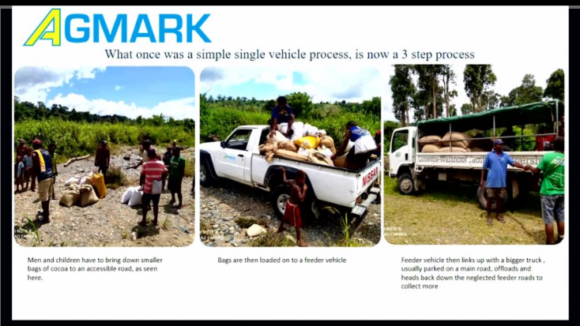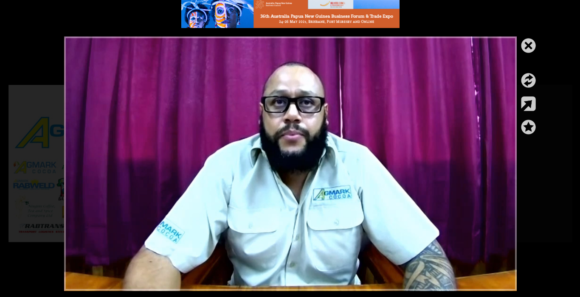Getting produce to market is one of the biggest constraints on Papua New Guinea’s cocoa industry, according to the Chief Operating Officer of leading cocoa exporter, NGIP Agmark. Steven Nightingale says his company is developing a model that is helping to improve the situation.
The roads in East New Britain have deteriorated over the past three-to-four years, according to NGIP Agmark’s COO Steven Nightingale. Growers, he explains, have to walk with cocoa bags of about 10 kilos each, cross the river overnight, wait for the transportation to pick up the bags and then see the vehicle down the roads. The process takes about 24 hours, he explains – and the labour costs combined with the transportation price are unsurmountable.
Nightingale told a recent business forum that Agmark is developing a model in East New Britain Province to help farmers deliver quality produce despite the road constraints.
Stronger together
The model involves organising groups of farmers into co-ops. Agmark organises for the bags to be picked up by a truck provided by an NGO at an accessible cost and at a set date. This process helps to reduce the hours individual farmers spend getting their produce to market and ensures they get paid.
The son of the late cocoa trading pioneer John Nightingale, Steven Nightingale says that over the past three months, Agmark has been working on the model with farmers in ENB’s Pomio District. The co-op now has 60 farmers who have produced about 500 bags of cocoa, each of which sells at an average price of K400 kina.
The company has partnered with an NGO that charges K15 per bag for transportation.
Nightingale explains that if a farmer can produce about 260 bags a year at an average price of K400 then it’s a K104,000 for the farmer per year, minus the transportation cost.
He mentioned that, in the last fortnight, the co-op earned K135,000.
‘This was to a very small community, but there are thousands of farmers. If we have those thousands producing what these guys are able to produce, just imagine the economy in this very small region of PNG.’
This model, Nightingale explains, is also being trialled with a women and youth group composed of 840 farmers who also got ‘the constraints of the transport side of it.’

The three steps to get cocoa to market today used to be just one years ago, when the roads in East New Britain were in better condition.
The company is working with them and ‘slowly building quality controls’ and making sure ‘they’re not wasting money bringing in second grade cargo’.
‘We are getting it right at the source,’ says Nightingale. ‘We are working together with these different co-ops so that they all bring it [the cocoa] together at the same time and we can make it a bit more efficient for everyone.’
Not just cocoa
‘This is all a snowball effect. If we can get the authorities to work together with public companies in whatever industry it might be, you fix your roads and you develop a cheaper produce-to-market chain not only for cocoa,’ says Nightingale.
Identifying and working towards fixing the road and transportation problems also ‘increases volumes [of beans produced and sent to market] and it then increases exports; you increase forex, you increase incomes, livelihoods increase.’










Speak Your Mind